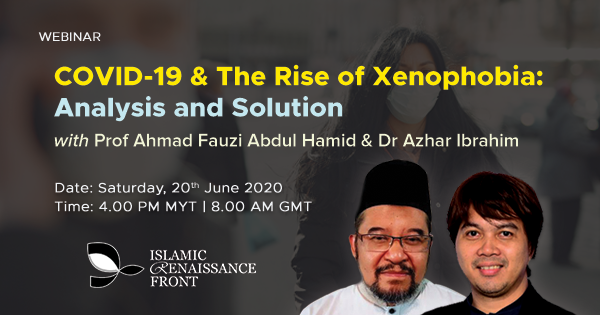
Date: Saturday, 20th June 2020
Time: 4PM MYT | 8.00AM GMT
Register at: https://www.eventbrite.com/e/webinar-covid-19-the-rise-of-xenophobia-analysis-solution-tickets-109771469420
*The Zoom link for the Webinar will be sent to your email on Saturday, 20th June at 10AM.
The issue of xenophobia is not a recent phenomenon. And every time wherever a pandemic goes, xenophobia is never far behind. The denigration of a certain population is a symptom familiar to us all during any viral outbreak. For disease foster fears – what more when it is easily transmissible – which is turn would foster discrimination. And with the geopolitical war rhetoric between China and the US, it is not surprising if some media outlets and certain US leaders continue to name this pandemic as “Wuhan virus”.
History has shown that during the 1853 yellow-fever outbreak in the US, European immigrants were the primary targets of stigmatization. And during the SARS outbreak which originated in China, the East Asians became the target, while Africans bore the stigma in the Ebola outbreak in 2014. Considering this factor, the World Health Organization has opted not to name the disease after the geographical location like what it did in naming Ebola after a river in Congo when it was first detected, or the Middle East Respiratory Syndrome or MERS as in 2012; for stigma is more dangerous than the virus itself.
For xenophobia is a phenomenon that resulted from the spread of coronavirus with the political situation in countries it spreads. It is not surprising that right-wing parties in Europe for example have reiterated their call for tougher immigration policies. Case in hand the far-right Italian leader Matteo Salvini had exploited the issue and erroneously linking it to the North African asylum seekers and urged for a border closure. Similar calls were made to end the Europe’s open-border system which is known as Schengen Area by right-wing political leaders in Germany, France, and Spain. And of course, the most famous is the call by the US President Donald Trump himself who used this issue to strengthen his argument for the need to construct a wall at the Mexico border.
This webinar intends to discuss and debate this issue and to find out whether there is a solution to this rise in xenophobia since this virus pandemic endangers the health of all of us with no distinction as to race, colour, religion, or ethnicity.
About the Speakers

Ahmad Fauzi Abdul Hamid is Professor of Political Science, School of Distance Education, and Consultant Researcher with the Centre for Policy Research and International Studies (CenPRIS), Universiti Sains Malaysia (USM), Penang, Malaysia. In 2008-09 and 2015-16, he held Visiting Fellowships with the S. Rajaratnam School of International Studies (RSIS), Nanyang Technological University (NTU), and the ISEAS-Yusof Ishak Institute, Singapore, respectively. Trained as a political scientist and political economist at the universities of Oxford, Leeds and Newcastle, United Kingdom, his research interests lie within the field of political Islam in Southeast Asia. Ahmad Fauzi has published fifty scholarly articles in leading journals such as Indonesia and the Malay World, Islamic Studies, Asian Studies Review, Southeast Asian Studies, Journal of Asian and African Studies, Asian Journal of Political Science, Japanese Journal of Political Science, Asian Survey, Pacific Affairs, Sojourn, Islam and Christian-Muslim Relations, Contemporary Southeast Asia, The Round Table and Journal of the Malaysian Branch of the Royal Asiatic Society. He regularly contributes book chapters to edited volumes; recent ones include ‘Injecting God into politics: Modelling Asma’ul Husna as a Sufi-based panacea to political conflict in contemporary Malaysia’, in Sarwar Alam (ed.), Cultural Fusion of Sufi Islam: Alternative Paths to Mystical Faith (London and New York: Routledge, 2020) (with Noorulhafidzah Zawawi),; ‘Regaining the Islamic Centre? A Malaysian Chronicle of Moderation and its Discontents’, in Mohamed Nawab Mohamed Osman (ed.), Pathways to Contemporary Islam: New Trends in Critical Engagement (Amsterdam: Amsterdam University Press, 2020) and ‘Islam and Its Racial Dynamics in Malaysia’s 14th General Election’, in Meredith L. Weiss and Faisal S. Hazis (eds.), Towards A New Malaysia? The 2018 Election and its Aftermath (Singapore: National University of Singapore Press, 2020) (with Che Hamdan Che Mohd Razali). Ahmad Fauzi’s research monographs bear such titles as Islamic Education in Malaysia (RSIS, 2010), Political Islam and Islamist Politics in Malaysia (ISEAS, 2013), Middle Eastern Influences on Islamist Organizations in Malaysia: The Cases of ISMA, IRF and HTM (ISEAS, 2016) and The Extensive Salafization of Malaysian Islam (ISEAS, 2016). Ahmad Fauzi’s research has earned him airtime over international media outlets such as Singapore’s Channel News Asia and the British Broadcasting Corporation (BBC), besides giving occasional commentaries over Malaysia’s media channels such as The Star, The Edge, The Malay Mail Online and Free Malaysia Today. In May 2017, Ahmad Fauzi represented Malaysia at the Russia – Islamic World Strategic Meeting held in Grozny, Chechen Republic, Russian Federation. Since January 2019, Ahmad Fauzi has been chief editor of Kajian Malaysia: Journal of Malaysian Studies (USM Press).
 Azhar Ibrahim, PhD is a Lecturer at the Department of Malay Studies, National University of Singapore (NUS). He obtained his PhD., and MA, from the same Department in 2008 and 2002 respectively. Before joining NUS in 2009, he was a lecturer National Institute of Education, Nanyang Technological University. His research interest includes sociology of religion, sociology of literature and critical literacy, and the Malay-Indonesian intellectual development. He completed his post-doctoral research on the development of social theology at the Faculty of Theology, University of Copenhagen, Denmark, and later at Stanford University, USA. Amongst his published books are: Emancipated Education (2019), Historical Imagination and Cultural Responses to Colonialism and Nationalism: A Critical Malay(sian) Perspective(2017), Menyanggah Belenggu Kerancuan Fikiran Masakini (2016), Contemporary Islamic Discourse in the Malay-Indonesia World: Critical Perspectives. (2014), Narrating Presence: Awakening from Cultural Amnesia. (2014).
Azhar Ibrahim, PhD is a Lecturer at the Department of Malay Studies, National University of Singapore (NUS). He obtained his PhD., and MA, from the same Department in 2008 and 2002 respectively. Before joining NUS in 2009, he was a lecturer National Institute of Education, Nanyang Technological University. His research interest includes sociology of religion, sociology of literature and critical literacy, and the Malay-Indonesian intellectual development. He completed his post-doctoral research on the development of social theology at the Faculty of Theology, University of Copenhagen, Denmark, and later at Stanford University, USA. Amongst his published books are: Emancipated Education (2019), Historical Imagination and Cultural Responses to Colonialism and Nationalism: A Critical Malay(sian) Perspective(2017), Menyanggah Belenggu Kerancuan Fikiran Masakini (2016), Contemporary Islamic Discourse in the Malay-Indonesia World: Critical Perspectives. (2014), Narrating Presence: Awakening from Cultural Amnesia. (2014).
Program:
400-410PM: Introduction by the Moderator, Ehsan Shahwahid
410-440PM: Presentation by Prof Ahamd Fauzi Abdul Hamid, USM
440-510PM: Presentation by Dr Azhar Ibrahim, NUS
510-555PM: Discussion
555-600PM: Concluding remarks by the Moderator, Ehsan Shahwahid
Organized by: Islamic Renaissance Front

